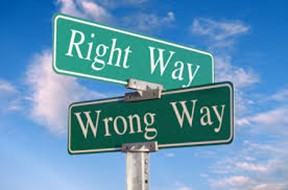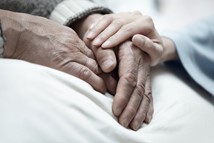Relativism is a form of subjectivism which shifts the locus of truth and reality from the object to the subject. Because subjects (people) differ in their perceptions, the truth is then claimed to be relative. This leads to tyranny, however, because when we can no longer point to reality and reason to make our point, we are left with shouting and pressuring. Who wins when reason and reality itself are jettisoned? Those with the most money, power, and influence: those who are loudest; those who are fiercest; those who are willing to go to the extremes to force their opinion. When reason and God’s reality are thrust aside, the loud, the powerful, the arrogant, and the extreme get their way. (Msgr. Charles Pope)
Listening to both Bishop Bill and Bishop Peter Stuart, I was reminded of an address, given by Richard Gaillardetz at the National Pastoral Leaders and Planners Conference at the beginning of September, titled Wrestling with the Faith in Times of Scandal: Why Belonging to the Church Still Matters. Richard is the Joseph Professor of Catholic Systematic Theology at Boston College and is currently the Chair of the Theology Department. Some of you may have attended his talk in the diocese during that same week.
Richard challenged us with the concept that faith is not just intellectual thoughts or a matter of belief in doctrine. It is primarily about love - what we love and desire and how that motivates us and drives us. How can our communities be places where love transforms us and our world? We are at a time when there is a shift in our faith  expression from one of laws, rules and regulations to faith as a way of life. And we are attempting to grow this understanding at a time when religion in most of the Western world is subject to a grave battering.
expression from one of laws, rules and regulations to faith as a way of life. And we are attempting to grow this understanding at a time when religion in most of the Western world is subject to a grave battering.
Wrestling with the Faith is a real response to this time of scandal, crisis, suspicion and mistrust, but it is also a time of renewal and opportunity. In his address, Richard made a case for ecclesial belonging in this time of struggle.
I noted six points which I will share with you briefly. I don’t begin to believe these adequately cover the depth of his message.
- We are transitioning from a church which was the exclusive repository of grace and truth. We now realise that grace and truth can be encountered outside of this church. He spoke about our need to begin with a spiritual anthropology as an alternative construction. He invited us to think about the person as a lover and not as a thinker, which in turn invites us to move from a religion of ideas to a religion of relationships, as an embodied person of desire. Much of how we navigate our lives comes from intuitive know-how, based on our desires, and what drives us or our passions. If this is our starting point, then the church needs to offer a pedagogy of desire, and discipleship becomes an embodied learning as a way of life. The church moves from a static repository of faith to an active agent of faith. We recall that Jesus is the Word made flesh, God’s body present in the here and now.
 The recovery of authentic doctrine as the grammar of an authentic spirituality and the practice of discipleship. He spoke often throughout the days of the conference about the grammar of doctrine. Doctrine and human experience must be intimately connected. It is doctrine that gives our faith shape, the same way that grammar works for us in our language and communication. I have reflected on this point and tried to imagine trying to speak English without the rules of grammar. What a mess we would be in!
The recovery of authentic doctrine as the grammar of an authentic spirituality and the practice of discipleship. He spoke often throughout the days of the conference about the grammar of doctrine. Doctrine and human experience must be intimately connected. It is doctrine that gives our faith shape, the same way that grammar works for us in our language and communication. I have reflected on this point and tried to imagine trying to speak English without the rules of grammar. What a mess we would be in!- We must become a community that teaches people how to wrestle with faith. We must be troubled by our faith and be willing to wrestle with it. It is not about being comfortable, for we can learn from something we might naturally want to reject. We will not be transformed unless we engage with what makes us feel disturbed.
- It is essential we become a listening church, or as we have heard recently, a synodal church. We frequently refer to consultation, collaboration and co-operation, but we struggle with what this looks like in reality. This will mean that we do not agree with everyone or everything that is said or done. This too requires wrestling and deep respect.
- Our communities must be places of compassion and mercy compared to the societal phenomenon of happiness at any cost. We are a church of the Paschal Mystery which believes that happiness comes through and beyond suffering. We believe that because God journeys with us and promises to be at our side that we are not alone. How do we give voice to the suffering of individuals and communities? Our communities need to be places of hospitality and of contemplative, liturgical practice.
- There is a need for ecclesial humility, repentance and genuine contrition. Some individuals and our institutional structures have failed us. We are called to repentance and conversion. We have often been too concerned with the preservation and reputation of the institution.
I believe that these six key messages provide us with a scaffold for moving forward, by not rejecting what are the essential elements to our faith.
I am conscious that I am writing this at a time when the Victorian Parliament has passed a Voluntary Assisted Dying Bill in its Lower House. I can’t help but note the opinion piece by Paul Keating in Friday’s Sydney Morning Herald (20/10/17) in which he characterized those efforts as misguided, warning that as technology, lifestyle, nutrition, and medicine improved, it was precisely the wrong time to be sending a confusing message to the medical profession. He referred to this as a serious ethical decision. He wrote, “This is a threshold moment we should not cross.” He also said: “No matter what justifications are offered for the bill, it constitutes an unacceptable departure in our approach to human existence and the sanctity that should govern our understanding of what it means to be human.” He goes onto say: “There is a consequence for this for the entire society.”
 Once this bill is passed the expectations of patients and families will change. The culture of dying, despite certain and intense resistance will gradually permeate our medical, health, social and institutional arrangements. It stands for everything a truly civil society should stand against. A change of this kind will affect our entire community not just a small number of dying patients. It is fatuous to assert that patients will not feel under pressure once this bill becomes law to nominate themselves for termination.
Once this bill is passed the expectations of patients and families will change. The culture of dying, despite certain and intense resistance will gradually permeate our medical, health, social and institutional arrangements. It stands for everything a truly civil society should stand against. A change of this kind will affect our entire community not just a small number of dying patients. It is fatuous to assert that patients will not feel under pressure once this bill becomes law to nominate themselves for termination.
Opposition to this bill is not about religion. It is about the civilisational ethic that should be at the heart of our secular society. The concerns I express are shared by people of both any religion or no religion. In public life it is the principles that matter. They define the norms and values of a society and, in this case, the principles concern our view of human life itself. It is a mistake for legislators to act on the deeply-held emotional concerns of many when that involves crossing a threshold that will affect the entire society in perpetuity.
 I go back to my message of last week in which I referred to the four-legged stool of Scripture, Reason, Tradition and Experience. It seems to me that good decisions are made by wrestling with these four elements so as to live fully as human beings. I agree with Paul Keating’s position - we lost something very deeply human of Friday and we as a society will be the poorer and more troubled for that. The centre of our compass seems to have become dislodged and we may well lose our bearings.
I go back to my message of last week in which I referred to the four-legged stool of Scripture, Reason, Tradition and Experience. It seems to me that good decisions are made by wrestling with these four elements so as to live fully as human beings. I agree with Paul Keating’s position - we lost something very deeply human of Friday and we as a society will be the poorer and more troubled for that. The centre of our compass seems to have become dislodged and we may well lose our bearings.
I implore all of us to immerse ourselves in contemplative prayer. These are sad and troubling times.